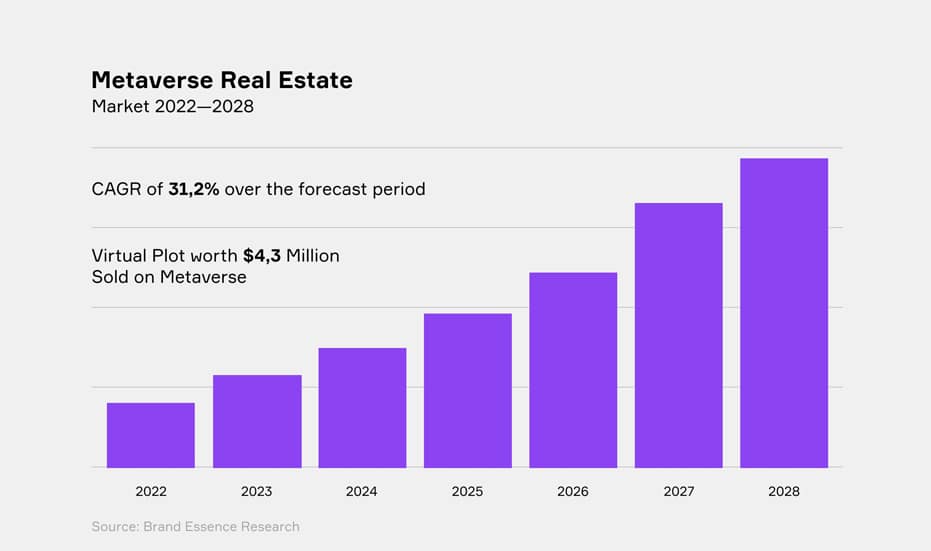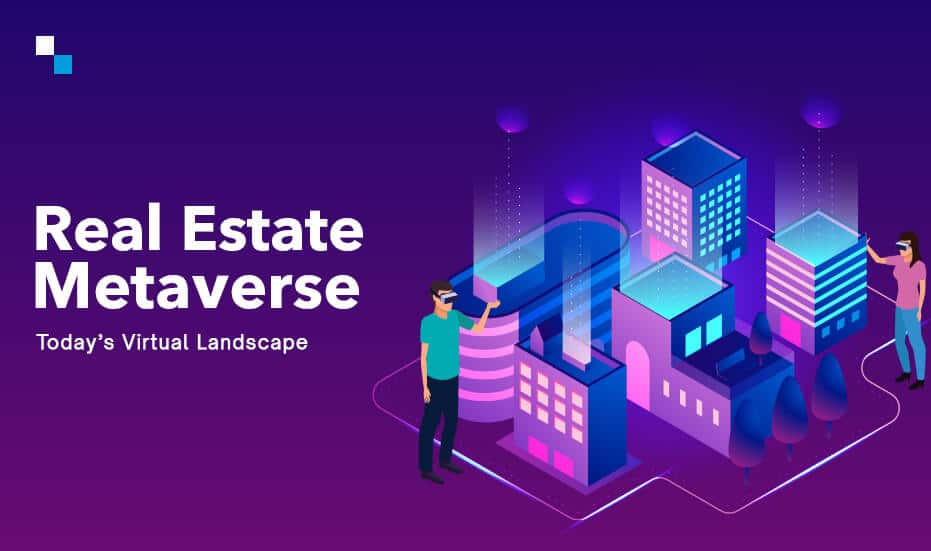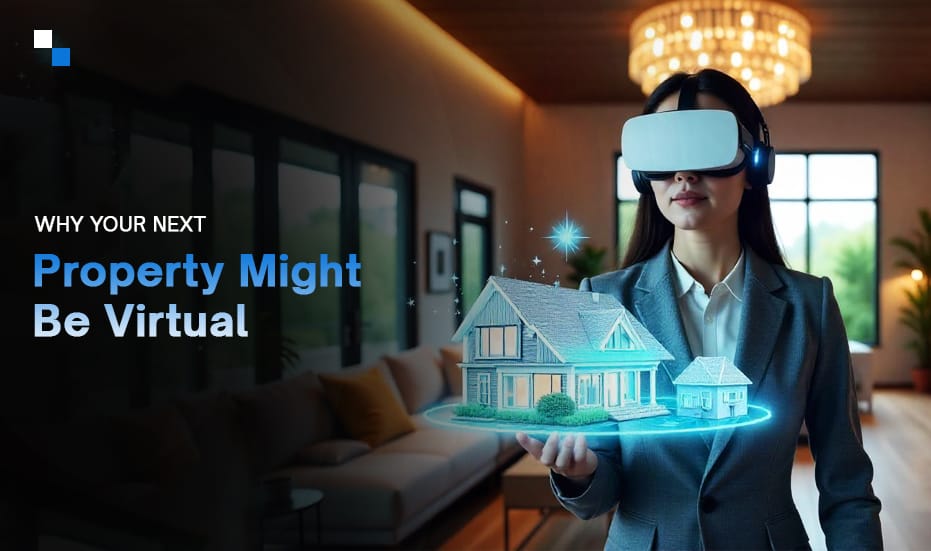As we entered the year 2023, a new dimension of possibilities revealed itself, transcending the conventional limitations of physical land tours. Imagine people strolling through bustling streets without taking a step; envision owning a piece of virtual landscape that surpasses geographical confines; and picture a realm where architectural marvels are conceived and realized with just a click. The metaverse is opening up gates for this as well. Now, people need not step out of their comfort zone to visit a property; instead, the tour comes to them virtually through metaverse real estate development.
Metaverse Real Estate Development
The process of developing metaverse real estate involves crafting virtual properties and spaces in a shared digital realm. Architects merge design and technology, creating buildings, landscapes, and venues within the metaverse. This dynamic field shapes user experiences and interactions in a physical and virtual reality convergence. It’s an innovative blend of architecture and digital artistry created by a Metaverse real estate development company.
Pixelated Possibilities of the Real Estate Metaverse
“People spend a lot of time on the internet, so why wouldn’t they spend time in the Metaverse? Especially when they can experience more than just the 2D interactions found on real estate websites,” says Mark Zuckerberg, CEO of Facebook.
The perspective illuminates a promising path for the Metaverse’s growth, from enhancing user experiences to reshaping industries, with its potential impact stretching far beyond traditional online interactions to real estate and properties.The growing enthusiasm among people underscores the promising indications of significant economic opportunities.

In 2021, the value of metaverse property experienced an astounding 700% increase, driving the entire market to achieve a valuation of $500 million. Anticipating projections suggest that the market has the potential to expand twofold, after reaching a significant milestone of $1 billion by the year 2022. As of now in 2023, these developments continue to shape the metaverse landscape and are expected to grow more rapidly.
Advantages of Metaverse Real Estate
Certainly! The Metaverse is exciting and rapidly evolving, and so is every Metaverse real estate development company involved in it. The real estate business within it holds numerous unique advantages. Here are some advantages to engaging in the Metaverse real estate business:
- Infinite Architectural Possibilities: In the Metaverse, you’re not limited by physical constraints. You can design and construct breathtaking structures that defy gravity, logic, and even physics.
- Timeless Design Preservation: Unlike physical buildings that deteriorate over time, digital real estate can be maintained indefinitely. Your creations can exist for generations, serving as a testament to your creative vision and craftsmanship.
- Global Accessibility: Metaverse real estate transcends geographical boundaries. Investors and visitors from around the world can experience your virtual properties without the need for travel, making it a truly global business opportunity.
- Sustainable Innovation: Embrace eco-friendly designs and technologies without constraints. Implement energy-efficient systems, renewable resources, and innovative green infrastructure to showcase your commitment to sustainability.
- Dynamic Income Streams: Hosting virtual events, conferences, or concerts in your digital spaces can generate continuous revenue. Your properties can become versatile venues for entertainment, education, and cultural exchange.
- Interactive Engagement: Metaverse real estate allows for unprecedented interactivity. Visitors can touch, interact with, and even modify the environment, creating immersive experiences that leave a lasting impression.
- Redefining Luxury: Curate luxurious environments that cater to the desires and fantasies of your clients. Imagine offering private island retreats on floating clouds or penthouses atop towering skyscrapers that offer panoramic views of virtual landscapes.
- Collaborative Creativity: Forge partnerships with artists, designers, and architects from diverse backgrounds to create collaborative, cross-disciplinary virtual spaces that push the boundaries of creativity and innovation.
- Unlimited Personalization: Offer clients the ability to personalize their virtual properties to an unprecedented degree. From changing wall colors with a thought to rearranging entire buildings with a flick of the wrist, the Metaverse allows for ultimate customization.
- Exploration and Discovery: Develop immersive, hidden worlds within your properties, encouraging visitors to explore secret passages, uncover hidden treasures, and engage in quests, turning your real estate into an adventure playground.
- Social Connection: Create virtual communities within your properties, where like-minded individuals can connect, socialize, and collaborate in exciting and novel ways.
- Future-Proof Investment: Metaverse real estate represents a forward-looking investment. As technology advances and the Metaverse evolves, your properties can seamlessly adapt to new platforms, ensuring continued relevance and value.
- Immersive Learning Spaces: Design educational hubs where learners can engage with historical events, scientific concepts, and cultural experiences through interactive, immersive simulations.
The perks of the Metaverse real estate business extend far beyond the limitations of physical real estate, offering a canvas for boundless creativity, innovation, and limitless possibilities. It’s a realm where imagination truly knows no bounds.
Start your Own Real Estate Metaverse Platform
Schedule Free DemoPotential Adopters of Metaverse Real estate Development
Various companies and platforms were exploring the development of metaverse ecosystems, and several entities might have the potential to own or control real estate in these environments. These entities could include:
- Technology Companies: Tech giants like Facebook (now Meta), Google, Microsoft, and others have the resources and capabilities to create and manage metaverse platforms that include virtual real estate.
- Game Developers and Platforms: Companies that create multiplayer online games or virtual worlds, such as Epic Games (with Fortnite) or Roblox, could offer virtual real estate as part of their experiences.
- Virtual Reality and Augmented Reality Companies: Firms specializing in VR and AR technologies might provide the infrastructure for the metaverse and offer real estate as part of their offerings.
- Blockchain and Cryptocurrency Projects: Blockchain technology, especially non-fungible tokens (NFTs), could be used to establish ownership of virtual real estate and assets within the metaverse.
- Creative Individuals and Artists: Just like individuals create and monetize content on platforms like YouTube or Twitch, they might also be able to own and generate income from virtual Metaverse real estate development.
- Corporations and Brands: Businesses might use the metaverse for branding, marketing, and customer engagement, possibly through virtual real estate.
- Investors and Speculators: Similar to real-world real estate markets, there could be investors who speculate on virtual land and properties within the metaverse.
- Governments and Organizations: Public or private organizations might establish a presence in the metaverse for various purposes, including education, conferences, exhibitions, and more.
Build your own Real Estate Metaverse with Antier!
Partner with Antier, the finest Metaverse real estate development company, to transform your real estate dreams into virtual reality. Through our expertise spanning VR, blockchain, and design, Antier empowers you to craft an immersive, secure, and interactive real estate metaverse. Unveil properties, facilitate transactions, and elevate user experiences in a futuristic digital realm.
Join hands with Antier for a pioneering journey toward reshaping the real estate landscape. Embrace innovation, amplify engagement, and unlock the potential of a dynamic virtual future alongside a trusted industry leader.





